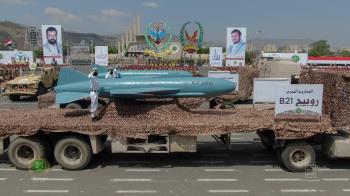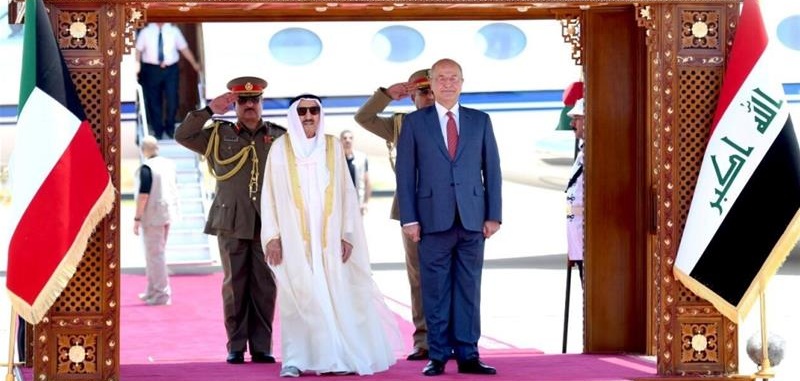Alwaght- Following the visit of Kuwait's Emir Sheikh Sabah Al-Ahmad Al-Jaber Al-Sabah's to Iraq and his meeting with the Iraqi leaders, the two countries issued a joint statement emphasizing on “wise stances” in their dealing with the recent developments in the Persian Gulf region to prevent escalation of tensions that risk a military confrontation in the region. Strengthening diplomatic give and takes with regional countries has given rise to some questions about Kuwait intents. Where is the Kuwait's place in the recent developments? Why does Kuwait emphasize on strengthening the relationship with Iraq?
Kuwait-Iraq relations
Before the US invasion of Iraq in 2003 that toppled the regime of Saddam Hussein, the bilateral ties were frozen as they lacked official diplomatic representation since Saddam’s invasion of Kuwait in the early 1990s. This situation, however, transformed with the change of government in Baghdad. After two decades, Kuwait in 2008 reopened its embassy in Baghdad.
After Iraqi leadership agreed to pay $47 billion in war compensations to Kuwait, the Persian Gulf state's leaders tried not to allow the compensation case set up roadblocks ahead of the development of the bilateral relations. Thus, they accepted Iraq's suggestion to pay part of the compensation through free gas exports. Kuwait, furthermore, supported Iraq’s return to the (Persian) Gulf Cooperation Council. Kuwait also hosted the first conference on Iraq reconstruction in 2018 and managed to take promises of collecting $30 billion in rebuilding aids from the participating states.
Kuwait’s efforts to help Iraq recover from the damages of war return to the fact that insecurity in Iraq can impact Kuwait which shares 190 kilometers of borders with Iraq. It can be said that a significant part of emir’s trip is aimed to tell Iraq that Kuwait has trust in Baghdad’s new government. This was the same factor that motivated Barham Salih, Iraq’s new president, to choose Kuwait as the destination of his first foreign visit in the post in November last year. So, Iraq also shares the same feeling about the need for the two countries to expand their relationship.
Common security concerns
Due to its geopolitical features, Kuwait is highly susceptible to regional crises. Over the past few years, specifically after Saudi-led blockade on Qatar, some Arab countries have heightened their efforts to diversify their security transactions. Kuwait, Iraq, and Oman are the top countries on the list. Many analysts believe that should Saudi Arabia succeeded in its anti-Qatari measures, the next victim was Kuwait.
Two years ago, Khaled al-Rodhan, Kuwait’s sports and youths minister, visited Doha to broaden ties with Qatar. Turki Al-Sheikh, an advisor to the Saudi Crown Minister Mohammed bin Salman, blasted in a Twitter message the Kuwaiti minister for the visit, calling him “a mercenary.” Lebanon’s Al-Akhbar newspaper has once reported that the Saudi orbit’s crisis with Qatar sent Kuwait and Oman worried, making them live in a fear of falling victim to similar Saudi behavior anytime. So, Kuwait finds Riyadh’s destabilizing measures and support for the war in the region a threat to its vital interests.
On the other hand, the US escalatory policies in the region make Kuwait face a serious challenge in its alliance with Washington. Following Saddam’s attack on Kuwait and occupation of the country and the Arab states’ failure to repel the campaign, Kuwait went under some sort of US mandate as Washington and its allies forced Saddam out. Kuwait understands that if it fully sides with the American policies, it will, in fact, increase chances of security challenges in the region from which Kuwait will take the biggest damage.
Following the recent oil tankers attacks, Al-Rai newspaper said that Kuwait leaders put the country on high alert. Marzough al-Ghanim, Kuwait’s parliament speaker, in May cautioned about the possible military confrontation in the Persian Gulf. He reportedly in a closed-door meeting of the parliament and government told the participants that developments suggest that war possibility is high and this is “against what we all wish.”
Over the past years, Kuwait tried active diplomacy to alleviate regional tensions. Iraq makes similar efforts. Many Iraqi politicians are concerned about heightened tensions between Washington and Tehran. Iraq’s Prime Minister Adel Abdul Mahdi has recently sent representatives in a bid to calm the situation between the US and Iran. Kuwait eyes the same role with Baghdad. Abdul Mahdi, commenting on the emir’s visit, said that the travel was important not only for bilateral ties but also for the region.
New role-playing in regional equations
Regarding Iran’s fight against terrorism in Syria and Iraq and giver cecurity voncerns of such countries as Kuwait and Iraq has made the two Arab countries to pay special attention to stability on the Iranian borders. Even if the Saudi-dominated (P) GCC accompanies Trump against Iran, Kuwait cannot take the same path. This is proved in the Yemen war. Although Riyadh announced Kuwait’s name as a partner to its military coalition against Yemen, Kuwaiti leaders declined to show serious support to the 2015 campaign. That appears to be why last year Riyadh asked Kuwait to pay $10 billion in war costs to the Arab kingdom.
Moreover, the Muslim Brotherhood, a movement labeled as terrorist by Saudi Arabia and allies, is not on the Kuwaiti terror blacklist. The movement has at least three representatives in the Kuwaiti parliament. So, any patronage to the Saudi and Emirati destabilizing policies can cause political splits inside Kuwait.
Additionally, Kuwait plans to build an investment-oriented city, dubbed Silk City, by 2035 to connect to the neighbors economically. Bakhit Al-Rashidi, Kuwait’s oil minister, last year said that Kuwait will cooperate with Baghdad to develop a shared oilfield. This comes while Saudi Arabia extended a contract with an American oil company to develop a common oilfield with Kuwait for 30 years without coordination with its partner.
Kuwait seeks to diversify its partnerships to secure independent economic and security policies. This path serves the aim to cut the dependence it fell in after 1990 due to foreign protection against Saddam invasion. So, choosing Iraq in the middle of heightened tensions in the region and sensitive conditions is not without reason, of course, something Iraq is aware of.



























